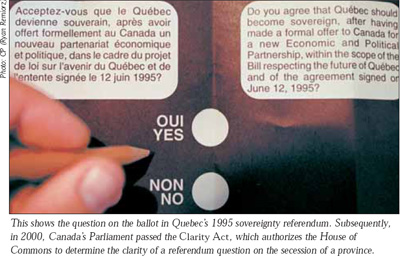That 100+ word referendum question & other Quebec curios
Language is a sticky situation. One can look at it from many angles. From the flubs of politicians saying the right/wrong thing at a positively inopportune moment to particularly mind-boggling speeches that have more glib than content, the way we choose words is important. It gives a writer’s character, and hopefully gets something across, if that’s the intention. Which it might not be.
One of the jokes that civil law lawyers make about common law is that common law puts in every word imaginable to cover their bases in case of a litigation. Civil law, on the other hand, uses a singular term to cover many events. And this is true, to an extent. One glance between the Civil Code of Quebec and, for example, the Criminal Code can quickly regulate the situation. (Case in point: the Criminal Code’s dispositions of treason includes the crime of “military or scientific information or any sketch, plan, model, article, note or document of a military or scientific character”, whereas the Civil Code, if criminal acts were under its jurisdiction, might only state “document”, for instance). Seriously, some of those dispositions look like they are coming straight out of the television series Yes Minister.
Another interesting situations is the use of language in the Quebec referendum questions. The first question back in 1980 was over 100 words in both its English and French form. Needless to say, it was criticized for its lack of clarity, possibly contributing as a scare factor that led to the 60% no vote. (I mean, just take a look at the question.) The second referendum question was much simpler 40-something word question. It’s a great improvement from the first referendum. For one, that’s approximately a sixty word difference. Give some credit where credit is due. It’s sort of like those foods that promise 60% less gobbledygook but still inevitably still have 40% gobbledygook in them. Still, this question garnered a victory of the no side by a squeaky 51% to 49%. Uproar and Supreme Court decisions ensue.
However, all is not lost. With the passing of the Clarity Act shortly after the Supreme Court’s statement about Quebec unilateral cessation (in a word: no), there will most likely never be a question more than 100 words long—in a political referendum, at least. The Clarity Act does not govern university regulations, which means that all questions on exams don’t necessarily have a clear question, much less a clear answer. Political science students, be afraid. Be very afraid.






